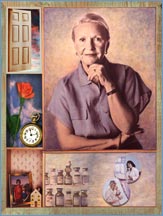
December 2000
We have learned about what you need to know by talking to
health care consumers. The following personal stories are
examples of how we have learned from experience.
|
Wait, I have questions.
A husband was admitted to the hospital to undergo
testing for some recent symptoms he had developed. His wife
was with him when the neurologist came in to tell them the
results. The physician remained standing, and abruptly
announced that the man had multiple sclerosis (MS).
The wife surmised that he was preparing to leave, and
quickly positioned herself between him and the door. She
said that they had many questions and needed a lot more
information about MS. The physician replied that he was very
busy and needed to go see some other patients. The wife
politely but firmly told him, "You can't give us such
devastating news and then just leave. You should have known
that we would have questions, and scheduled enough time to
talk with us." The physician sat down and answered their
questions.
|
I usually cannot think of anything to say when I get
unexpected news. What I have learned to do is give myself
time so I can get the answers I need. You can say, I am
shocked with this information and know I will have lots of
questions. When are you available to answer my
questions? This gives you time to collect yourself and
decide what questions you have. It also makes it clear that
you need to talk more.
If you cannot get your provider to talk to you, most
hospitals have a patient representative and HMO's have a
patient advocate or ombudsman you can ask for assistance.
You have a right to have ALL your questions
answered.
We are all used to reporting symptoms to our health care
providers, so the provider can treat them. But what do you
do if the provider does not believe you have a problem?
Mrs. Smith and her daughter Ann found themselves in this
situation:
|
Anyone listening?
Mrs. Smith had been on chemotherapy for her cancer for a few
months. Her daughter Ann told the doctor that she was
becoming very ill with the chemotherapy. The doctor replied
that "she shouldn't be that sick," and left the room. Ann
insisted to the nurse that the chemotherapy was making her
mother very ill. The nurse did further tests and discovered
that Mrs. Smith was in renal failure (her kidneys were not
working correctly). She was admitted to the Intensive Care
Unit of the hospital.
|
Ann teaches us a very important lesson. If a health care
provider does not believe your symptoms, you need to find
another provider. Sometimes it is not possible to actually
change providers. In that case, you need to be firm with
the provider you have, and insist that he or she check out
your complaint. Also, report the symptoms to everyone
involved in the patient's care - specialists, interns,
nurses, and therapists as well as the primary doctor. The
more people you tell, the more likely it is that someone
will listen.
Health Care Answers uses stories of real people trying to
take care of their health. Tell us your story. The stories
we use in our publications are from people like you. The
purpose of these true stories is to help others learn how to
use the medical system more effectively.
Click here if you want to submit a story.
Check back next month for more Personal Stories.
Past Stories 2000
December
Past Stories 2001
January
|
February
|
March
|
April
|
May
|
June
|
July
|
August
|
September
|
October
|
November
|
December
Past Stories 2002
January
|
February
|
March
|
April
|
May
|
Summer
|
September
Past Stories 2003
Winter
|
Spring
|


